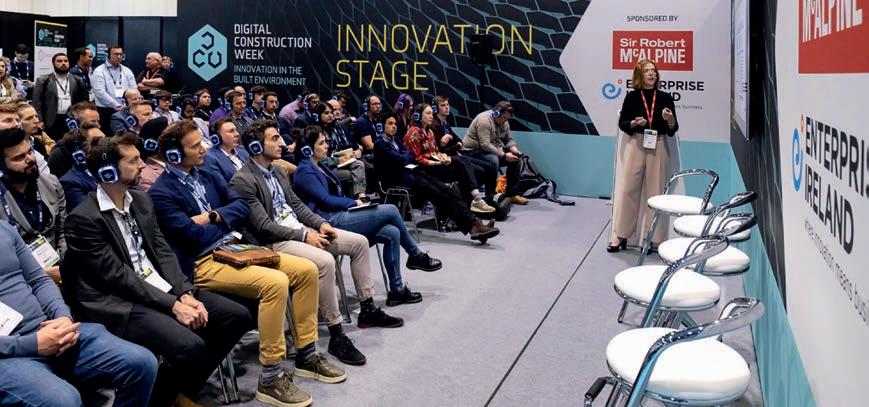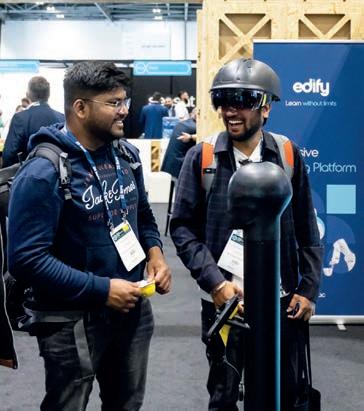
7 minute read
Five things to see at Digital Construction Week
The UK’s leading event for the digital construction community returns to ExCeL London from 17-18 May 2023. Here’s what to expect at this year’s show
Digital Construction Week (DCW) offers insights and inspiration to help built environment professionals design, build and operate better.
Advertisement
The show returns to ExCeL London on 17-18 May 2023, welcoming over 5,500 forwardthinking attendees eager to harness technology, streamline projects and drive much-needed change.
Visitors will meet over 150 big-name brands and cutting-edge startups showcasing the latest tech, tools and solutions for the built environment. Plus, they’ll hear from the industry’s brightest minds and get up to speed with key trends in the free-to-attend education programme featuring over 300 expert speakers.
If that’s not enough to strike up your interest, here are five reasons to visit DCW this year:
1 Hear the client perspective at the new Asset Management Stage
The 2023 show sees the introduction of the new Asset Management Stage, sponsored by Glider. The theatre will feature sessions focused on asset handover, management, maintenance and operation.
Speakers from government, local authorities, major projects and the private sector will share the clientside perspective. Find out what owner and occupiers really need from their assets and where you fit in.
Inspiring talks will help you join the dots between the construction and operational phases of projects. Learn about the digitised information and strategies available and how these can improve the way your assets are managed through their lifecycle.
2 Learn about decarbonising the built environment with ZERO
The ZERO team are back for 2023, partnering with Natural Building Systems to create a brand new ZERO Lounge at DCW. Here you can meet the team, discuss your decarbonisation objectives and grab a beer. They’ll also present their ZERO Roadmap outlining their plan to decarbonise the built environment.
The Net Zero Stage, in partnership with ZERO and sponsored by Autodesk, will also return. Sessions showcase pioneering projects and share solutions to help the industry on its path to net zero emissions.
3 See exclusive UK launches of the latest products
DCW is the place to see exclusive launches of the latest products. This year, be among the first to demo HP’s new SitePrint, an end-to-end suite of technologies designed to automate the site layout process.
Designed for autonomous operation, the SitePrint can improve the productivity of the site layout process. It features text printing capabilities that bring additional data from the digital model to the construction site.
HP will run live demonstrations of the SitePrint on the show floor. Look out for a registration link available soon to save your spot. Signing up is not mandatory, but priority will be given to those who do.
DCW offers a chance to get hands-on experience with the latest tech

4 Get to grips with information
Management
If you’re confused about the shift from building information modelling (BIM) to information management, look no further than the Information Management Stage at DCW (in partnership with nima and sponsored by the UK BIM Framework).
This stage is stacked with sessions on digitised information, data standards, the increase in digital maturity and what information management can do to support the built environment. With compelling real-world examples, attendees will learn how to effectively manage information.
And that’s not all: the Information Management Exchange will also return. The Exchange is a space to collaborate and share ideas, with a more informal format that includes ‘ask the experts’, ‘in conversation with...’ and ‘open mic’ style sessions.
In association with
Expect to see prototype technology and new ‘must-haves’ at the Start Up Village. Meet the brains behind the technology and put your questions to them face-to-face
5 Glimpse the future in the Start Up Village
DCW is working with the C-Tech Club to introduce you to a host of earlystage startups looking to shape the future of the built environment at the new Start Up Village.
Here you’ll learn how the latest concepts have the potential to solve some of the industry’s biggest challenges. Expect to see prototype technology and new ‘must-haves’ that set the bar high for digital construction. Meet the brains behind the technology and put your questions to them face-to-face.
The village will feature demo booths, networking and presentation spaces and private and bookable meeting pods. Be sure to pay a visit to meet emerging brands with big ideas. ●
Register for your free ticket: Digital Construction Week returns to ExCeL London from 17-18 May 2023. For more information and to register for a free trade ticket visit www.digitalconstructionweek.com.
What made you go into construction?
I had a keen interest in buildings and felt that it would enable me to spend some time in the office while also having the opportunity to get out and visit sites. I also wanted to do something that would help improve the environment around me and have a positive impact on communities.
What do you remember from your first project?
I remember the responsibility. It was both daunting and exciting for me at a young age to be involved in multi-million-pound projects and realise the impact my decisions could have on them – including their failure or success.

How do you think becoming a fellow has helped you in your career?’ Well, it definitely has. I became a fellow at the age of 34 and I would encourage others to become a fellow early enough in their career so that it can make a difference and is not something that is left to the latter part of their working life.
Becoming a fellow definitely improved my confidence and future career opportunities. I think knowing you have achieved fellowship changes your mindset. You know that you have reached the highest level within the institute and profession. This increased confidence has helped me take on certain challenges and roles that I may otherwise have not taken on. These challenges and roles have had a positive impact on my development and promotion opportunities.
In addition, FCIOB demonstrates to your client colleagues and peers that you have reached the highest level. They know they are dealing with an experienced professional that they can trust.
Is there a specific project or achievement you are most proud of?
I am proud of my achievement of becoming a partner of GSS. I joined GSS in 1998 as an assistant quantity surveyor, having spent a number of years previously working for a main contractor. It was a very different environment to what I was used to and there was a lot to learn.
I was, however, determined to develop and gain the right experience to enable me to move up through the company and take on new responsibilities. These new responsibilities led to promotions which have ultimately resulted in my achievement of becoming a partner. I think this demonstrates that if you work hard, don’t give up and always assert your best efforts then you can achieve your goals.
Is there anything in your career you would do differently now?
I could have possibly tried a few new or different experiences along the way, such as working abroad but I don’t regret not doing it. So far I have made career decisions that are right for me at that particular time in my life and that is all you can ever do.
Paul Vega CV
Employment:
● Partner, Gotch Saunders and Surridge LLP (GSS LLP)
2019-present
● Joined GSS LLP in 1998 as assistant quantity surveyor, progressing to associate in 2006
● Construction buyer, SDC Builders 1995-1998
Education:
● BSc (Hons) Quantity Surveying, University of Northampton
Professional memberships:
● Fellow of the Chartered Institute of Building
● Chartered Environmentalist
● Member of the Association for Project Management
What advice would you give to someone starting in construction today?
Don’t be afraid to ask questions. Ask as many as you can. People won’t expect you to know everything and you will learn so much from those around you.
Use your more experienced colleagues to learn from. There is so much experience within the industry and we need to make sure it is disseminated through to those making their first steps. They are the future of construction.
Also, try to join a professional institute such as CIOB as soon as you can – such as Tomorrow’s Leaders. It will help you on your journey to chartership and you will have such a support network around you.
What one thing would you change to make careers in construction more appealing?
I would change the perception and general image of the industry. Improving the image of construction has come a long way over recent years – and I do feel it has improved greatly – but I feel that to attract bright new talent it needs to promote itself as an industry that can provide a career that is diverse, professional, interesting, exciting and secure.
Sometimes young people appear not to be aware of the opportunities available to them and the number of different roles available to them on the professional and management side of things.
What has changed the most about construction since you’ve been working in it?
Procurement has changed a lot. When I started, the traditional procurement was still by far the most used form. The design team fully
Try to join a professional institute such as CIOB as soon as you can. It will help you on your journey to chartership and you will have such a support network around you
Paul Vega, GSS LLP
designed the building, the quantity surveyor produced the bills of quantities, it was tendered and the successful contractor built it. This has changed dramatically. Design and build has come to the forefront of procurement over the years. Frameworks are being used to procure work, two-stage tendering including an element of negotiation. Contractors are getting involved much earlier and delivering the design stages of projects as opposed to merely constructing to a completed design.
What’s the most valuable training you’ve received and why?
The training I have received ‘on the job’ is by far the most valuable. University or college teaches you the fundamentals and provides you with a good level of understanding, but it’s the actual ‘doing’ that really equips you with the necessary knowledge and skills in order for you to learn and develop. ●










